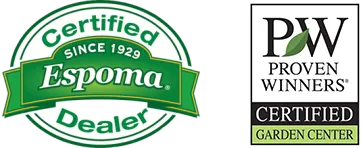What is mulch?
Basically, mulch is any material that is spread or laid over the surface of your soil and used as a covering.
What can mulch do for my yard?
So many things! When you add mulch to your yard, garden or landscape, you give the things growing there a huge advantage. You also protect and improve the soil in which your plants grow. See the answers to the more specific mulch questions below to get the whole picture.
Can mulch keep my plants warm?
Mulch helps keep the soil around your plants warm, which can promote earlier root growth in the spring, leading to earlier growth of your plants. At the other end of the spectrum, mulch can also delay your soil from freezing in the fall and winter, and prevent frost heaving.
Is it true that I won’t have to water my plants as much with mulch?
It’s true that mulch helps conserve and maintain soil moisture, which is a huge plus for your plants. It also slows runoff when it’s raining, and allows moisture to soak into the ground. Here’s the last thing… If you use organic mulch, the organic matter it adds to the soil can improve your soil’s water-holding capacity.
Does mulch provide protection?
It does, indeed, for your plants AND the soil in which they live. Mulch protects your plants and their roots from damage by equipment that includes mowers and weed eaters, plus it protects them from people walking and other wayward traffic that can compact the soil in the area around your plants. Finally, by covering the soil with mulch, you can minimize any soil erosion that may occur.
Does mulch prevent weeds?
This may be the most popular reason gardeners have for spreading mulch around their plants. Yes, mulch can suppress the weeds and grass that compete for the nutrients your garden plants need to thrive.
Does mulch improve the appearance of my yard?
Ta-dah! Spread mulch around your yard and garden beds and you have instant improvement. Bonus, it also makes garden and landscape maintenance easier.
What types of mulch are there?
Well, there are two main types, organic and inorganic. And then there are different kinds within those two types… Organic mulches include bark, wood chips, sawdust, pine straw, leaves and lawn clippings. These mulches tend to break down and need to be reapplied. Inorganic mulches include gravel, brick chips, and crushed stone. These typically just need to be applied once, and it’s recommended that this type of mulch be used only when you won’t be planting any new plants in the area.
What is bark mulch?
Shredded bark mulch is the most common type of mulch, and it’s typically available in bags or bulk. Bark mulch is organic mulch and is usually made from area pines or hardwood trees. Bark mulch also resists decomposition and provides organic matter to the soil
What is wood-chip mulch?
Mulch made from wood chips—or nuggets—is organic mulch, but to keep the chips from compacting, the Virginia Cooperative Extension recommends using chips or nuggets that are bigger than three inches. Also, be sure the chips are fresh; those that have been aged or composted can have products in them that may be toxic to young plants.
What is sawdust mulch?
Sawdust mulch is exactly what it sounds like: mulch made from sawdust. It’s inexpensive and widely available. It’s also typically acidic, which can be good for plants that like the acidity. Another advantage is that you can plow the sawdust into your soil, helping heavier soils become lighter, and lighter soils become more water retentive. However, if you use sawdust mulch, be sure to watch for plants turning yellow as that’s a sign of nitrogen deficiency; as sawdust breaks down, it absorbs nitrogen from the soil. And, spoiler alert, it breaks down pretty quickly, so you also need to watch that it doesn’t compact and form a mat, keeping air or water from getting to the roots of your mulched plants.
Can I use my lawn clippings as mulch?
Sure, your lawn clippings can be used as a mulch, but don’t forget, leaving clippings right there on your lawn will recycle those nutrients back into your lawn. But if you’ve sprayed them with any kind of broadleaf weed control, they should not be repurposed.
Can I use leaves as mulch?
Absolutely! Using leaf mulch gives your garden an attractive, natural appearance. But don’t just rake them up and throw them on your garden beds; the leaves you use as mulch should be partially rotted, shredded, and dried. Larger, intact leaves can form heavy mats that can cause issues with water and air infiltration. They can also trap water underneath them where decay and fungus can live happily ever after. Oak leaves and walnut leaves should be avoided due to their higher acidity or other harmful compounds.
Is pine straw a good mulch?
Pine straw mulch, like leaves, can give your garden beds a beautiful, natural look. Unlike leaves, they don’t compact, so you won’t have air and water issues to worry about. As you might have guessed, pine needles can add acidity to your soil, so you might want to test the pH level in your soil (and/or determine if you have acid-loving plants) if you are using pine straw.
Some mulch we’ve discussed adds acid to your soil. So what are some acid-loving plants that might appreciate this?
- Azaleas
- Hydrangeas
- Rhododendrons
- Gardenias
- Camellias
- Daffodils
- Holly Plants
- Blueberries
- Begonias
- Caladiums
Is there permanent mulch I can use?
For sure. So-called permanent or inorganic mulch includes gravel, brick chips, crushed stone, and even rubber nuggets, and typically only needs to be applied once. This type of mulch is often applied over a fabric layer and can be quite attractive, but you should do this where you aren’t planning on adding any more plants. But it’s not set it and forget it… You’ll still need to watch for weeds coming up each season. Sorry!
Also, permanent mulch like this can’t conserve moisture like the organic mulches can and, of course, don’t add any organic matter to the soil. They also don’t buffer temperatures as well as organic mulches. Also, as crushed stone and gravel may alter the pH of the soil, be sure to test your soil the following season to monitor pH levels.
What is the best mulch for me?
That’s a decision you’ll need to make. Take into consideration all the information you’ve found here. Think about how you want it to look. What it may or may not do for your plants and soil (good and not so good), and the maintenance it requires. You should be able to narrow down the choices pretty quickly.
How much mulch do I need?
A thin layer of mulch is attractive wherever you spread it. But for it to work properly in the suppression of weeds, moisture retention and reducing erosion, you’ll need to spread it to an effective thickness: at least two inches and no more than four inches.
Here at the Garden Market, our mulch comes in two-cubic-foot bags, which we like because they’re easier to handle, making it easier for you to place precisely where you need them in your garden.
Using our two-cubic-foot bag as our measurement…
- One bag installed at two-inch thickness covers twelve square feet.
- One bag installed at four-inch thickness covers six square feet.
How big is the area you need to cover?
- If you can divide that by twelve, it will give you the number of two-cubic-foot bags you’ll need to spread your mulch two inches thick.
- Divide it by six, and you’ll get the number of two-cubic-foot bags you’ll need to spread your mulch four inches thick.
Finally, take your trees’ advice and mulch!
Think about it. Haven’t trees been naturally mulching themselves for thousands of years? They drop their leaves or needles every year (or more often), creating that nice blanket under them. Not only can it be beautiful, this mulch also serves to reduce erosion by covering the soil, it retains moisture, and adds organic matter to the roots beneath it.
How smart is that? Be like the trees and mulch! Your Garden Market ALWAYS has mulch available, but now is an especially good time to “dress” your garden beds, making them nice and neat, and keeping your plants nice and cozy. Even better, you can order your mulch online for in-store pickup or local delivery. Mulch better? Indeed!








































































